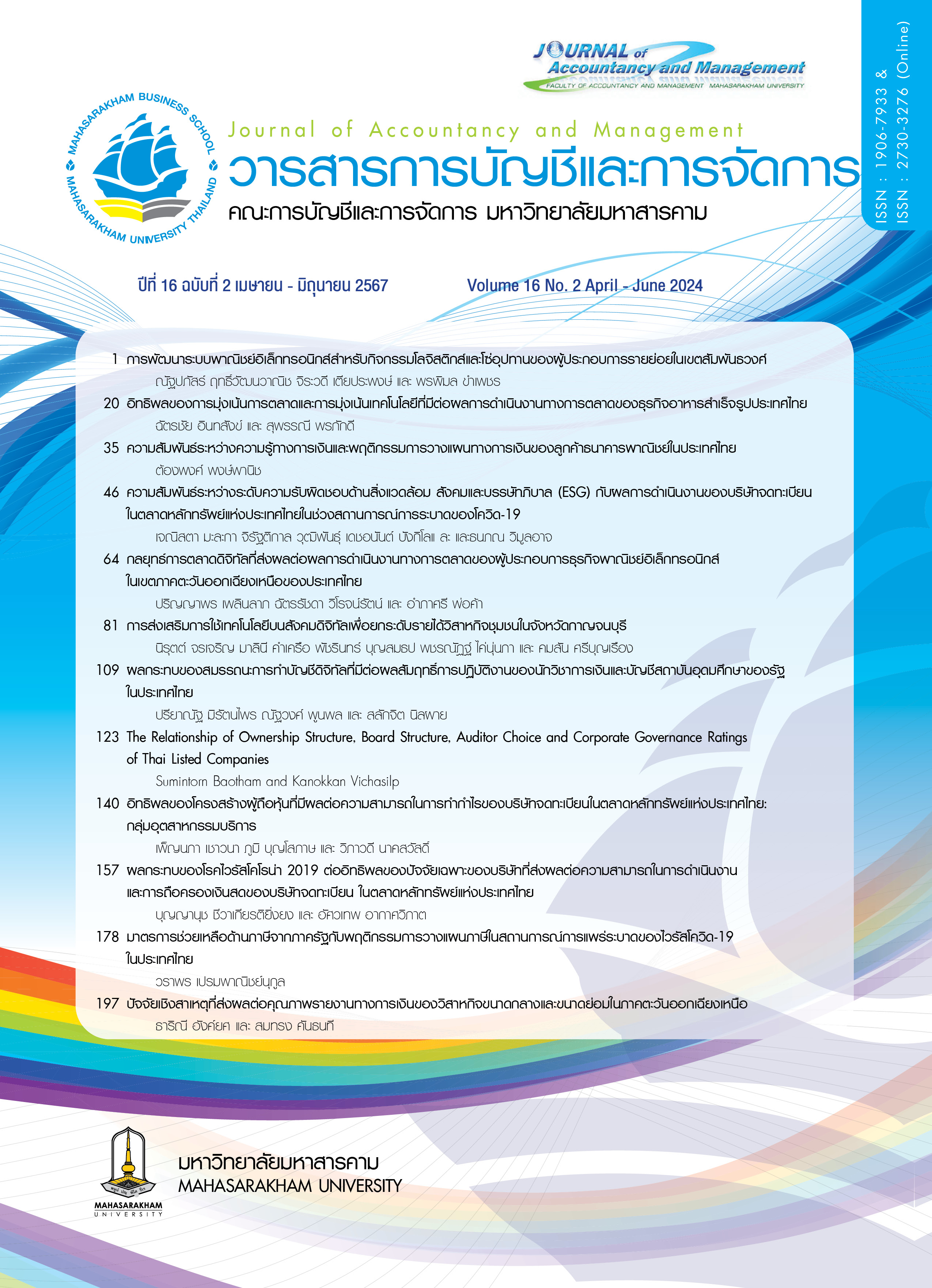อิทธิพลของโครงสร้างผู้ถือหุ้นที่มีผลต่อความสามารถในการทำกำไร ของบริษัทจดทะเบียนในตลาดหลักทรัพย์แห่งประเทศไทย: กลุ่มอุตสาหกรรมบริการ
Main Article Content
บทคัดย่อ
งานวิจัยนี้มีวัตถุประสงค์ 1) เพื่อศึกษาอิทธิพลของโครงสร้างผู้ถือหุ้นที่ส่งผลต่อความสามารถในการทำกำไรวัดจากอัตราผลตอบแทนต่อสินทรัพย์ของบริษัทจดทะเบียนในตลาดหลักทรัพย์แห่งประเทศไทย กลุ่มอุตสาหกรรมบริการ และ 2) เพื่อศึกษาอิทธิพลของโครงสร้างผู้ถือหุ้นที่ส่งผลต่อความสามารถในการทำกำไรวัดจากอัตราผลตอบแทนต่อส่วนของผู้ถือหุ้นของบริษัทจดทะเบียนในตลาดหลักทรัพย์แห่งประเทศไทย กลุ่มอุตสาหกรรมบริการ เป็นการวิจัยแบบเชิงปริมาณ (Quantitative Research) มีเครื่องมือในการวิจัย คือ กระดาษทำการ เก็บรวบรวมข้อมูลจากงบการเงิน รายงานประจำปีแบบแสดงรายการข้อมูลประจำปี (แบบ56-1) และหมายเหตุประกอบงบการเงิน โดยมีกลุ่มตัวอย่างคือ บริษัทจดทะเบียนในตลาดหลักทรัพย์แห่งประเทศไทย กลุ่มอุตสาหกรรมบริการ จำนวน 432 ตัวอย่าง แล้วนำข้อมูลที่รวบรวมได้จากกระดาษทำการมาวิเคราะห์ โดยใช้สถิติเชิงพรรณนา ประกอบด้วย ค่าร้อยละ ค่าเฉลี่ย ค่าเบี่ยงเบนมาตรฐาน และวิเคราะห์การถดถอยเชิงพหุคูณ ที่ระดับนัยสำคัญทางสถิติที่ 0.05
ผลการวิจัยพบว่า
1) โครงสร้างผู้ถือหุ้นด้านสัดส่วนการถือหุ้นของนักลงทุนต่างชาติมีอิทธิพลทางบวกกับความสามารถในการทำกำไรวัดจากอัตราผลตอบแทนต่อสินทรัพย์ของบริษัทอย่างเป็นนัยสำคัญที่ระดับความเชื่อมั่น 0.01 และโครงสร้างผู้ถือหุ้นด้านสัดส่วนการถือหุ้นของผู้บริหารมีอิทธิพลทางบวกกับความสามารถในการทำกำไรวัดจากอัตราผลตอบแทนต่อสินทรัพย์ของบริษัทอย่างเป็นนัยสำคัญที่ระดับความเชื่อมั่น 0.001 และ
2) โครงสร้างผู้ถือหุ้นด้านสัดส่วนการถือหุ้นของนักลงทุนสถาบันมีอิทธิพลทางบวกกับความสามารถในการทำกำไรวัดจากอัตราผลตอบแทนต่อสินทรัพย์ของบริษัทอย่างเป็นนัยสำคัญที่ระดับความเชื่อมั่น 0.01 และโครงสร้างผู้ถือหุ้นด้านสัดส่วนการถือหุ้นของผู้บริหาร มีอิทธิพลทางบวกกับความสามารถในการทำกำไรวัดจากอัตราผลตอบแทนต่อส่วนของผู้ถือหุ้นของบริษัทอย่างเป็นนัยสำคัญที่ระดับความเชื่อมั่น 0.001
Downloads
Article Details

อนุญาตภายใต้เงื่อนไข Creative Commons Attribution-NonCommercial-NoDerivatives 4.0 International License.
บทความที่ได้รับการตีพิมพ์เป็นลิขสิทธิ์ของวารสารการบัญชีและการจัดการ
ข้อความที่ปรากฏในบทความแต่ละเรื่องในวารสารวิชาการเล่มนี้เป็นความคิดเห็นส่วนตัวของผู้เขียนแต่ละท่านไม่เกี่ยวข้องกับมหาวิทยาลัยมหาสารคาม และคณาจารย์ท่านอื่นๆในมหาวิทยาลัยฯ แต่อย่างใด ความรับผิดชอบองค์ประกอบทั้งหมดของบทความแต่ละเรื่องเป็นของผู้เขียนแต่ละท่าน หากมีความผิดพลาดใดๆ ผู้เขียนแต่ละท่านจะรับผิดชอบบทความของตนเองแต่ผู้เดียว
เอกสารอ้างอิง
จารุวรรณ เอกสะพัง และ พิเชษฐ์ โสภาพงษ์. (2562). การวิเคราะห์อิทธิพลของโครงสร้างผู้ถือหุ้นที่มีต่อมูลค่าข้อมูลทางบัญชีของบริษัทจดทะเบียนในตลาดหลักทรัพย์แห่งประเทศไทย. วารสารสังคมศาสตร์และมานุษยวิทยาเชิงพุทธ, 5(6), 357-373.
ตลาดหลักทรัพย์แห่งประเทศไทย. (2565). การจัดกลุ่มอุตสาหกรรมและหมวดธุรกิจ. สืบค้นเมื่อ 15 มิถุนายน 2565, จาก https://www.set.or.th/th/regulations/simplified_regulations/industry_sector_p1.html
ณัฐวดี โพธิพฤกษ์ และ กนกศักดิ์ สุขวัฒนาสินิทธิ์. (2564). อิทธิพลของโครงสร้างผู้ถือหุ้นและโครงสร้างเงินทุนที่ส่งผลต่อความสามารถในการทำกำไรและผลตอบแทนหลักทรัพย์ของบริษัทจดทะเบียนกลุ่ม SET100 ในตลาดหลักทรัพย์แห่งประเทศไทย. วารสารสถาบันวิจัยและพัฒนา มหาวิทยาลัยราชภัฏมหาสารคาม, 8(2), 381-398.
ปัณณวัฒน์ วังอนุสรณ์ และคณะ. (2565). ทฤษฎีตัวแทน: ความท้าทายในการบริหารงานธุรกิจในประเทศไทย. วารสารบริหารธุรกิจ มหาวิทยาลัยแม่โจ้, 4(1), 1-22.
Al-Duais, S., Malek, M., Abdul-Hamid, M., Almasawa, A. M. (2021). Ownership structure and real earnings management: evidence from an emerging market. Journal of Accounting in Emerging Economies, 12(2), 380-404.
Alabdullah, T. (2021). Ownership Structure and the Failure or Success of Firm Performance: Evidence from Emerging Market; Cross-sectional Analysis. International Journal of Business and Management Invention, 10(8), 17-20.
Almashhadani, H. A., & Almashhadani, M. (2022). The impact of ownership on profitability: An conceptual study. International Journal of Business and Management Invention, 11(6), 1-6.
Anwar, H., & Buvanendra, S. (2019). Earnings Management and Ownership Structure: Evidence from Sri Lanka. Colombo Business Journal, 10(01), 44-65.
Arrow, K. J. (1971). The economic implications of learning by doing. In Readings in the Theory of Growth. London : Palgrave Macmillan.
Ebrahim, A. M. (2004). The Effectiveness of Corporate Governance, Institutional Ownership, and Audit Quality as Monitoring Devices of Earnings management. A Dissertation Submitted to the Graduate School - Newark Rutgers, The State University of New Jersey.
Nasrin, A., Zakaria, Z., & Sulaiman, N. A. (2019). The Quality of Accounting Information: Relevance or Value Relevance? Asian Journal of Accounting Perspectives, 12(1), 1-21.
Nguyen, H. A., Le, Q., & Vu, T. (2021). Ownership structure and earnings management: Empirical evidence from Vietnam. Cogent Business & Management, 8(1), 1-21.
Jensen, M., & Meckling, W. (1976). Theory of the firm: managerial Behavior,Agency Costs, and Ownership Structure. Journal of Financial Economies, 3, 305-360.
Parwar, A., Hussan, S., Waheed, A., Malik, Q. A., & Mehboob, M. (2021). Institutional Ownership Heterogeneity and Earnings Management Practices: Empirical Evidence from Pakistan. Journal of Asian Finance, Economics and Business, 8(6), 267-275.
Phothipruk, N., & Sukwatanasinit, K. (2021). The influence of ownership structure and capital structure on the profitability and stock return of set100 group registration in the stock exchange of Thailand. Journal of Research and Development Institute, Rajabhat Maha Sarakham University, 8(2), 381-398.
Reyna, J. (2018). The effect of ownership composition on earnings management: evidence for the Mexican stock exchange. Journal of Economics, Finance and Administrative Science, 23(46), 289-305.
Smith, A. (1937). The wealth of nations [1776] (Vol. 11937). na.
Tran, M. D., & Dang, N. H. (2021). The Impact of Ownership Structure on Earnings Management: The Case of Vietnam. SAGE Open, 10(2), 1-14.
Wati, E., & Gultom, O. (2021). The Impact of Ownership Structure on Earnings Management: Evidence from the Indonesian Stock Exchange. Journal of Accounting, Finance and Auditing Studies, 8(1), 152-175.
Wilson, R. (1968). The theory of syndicates. Econometrica, 36(1), 119-132.


